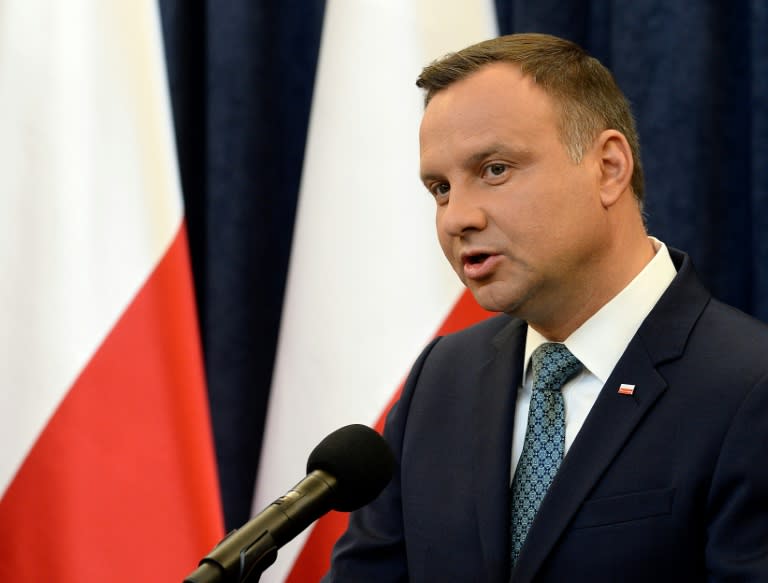Polish govt presses on after president vetoes contested court reforms
Poland's governing conservatives on Monday vowed to press on with judicial reforms, even after the president used his veto following huge street protests and threats of unprecedented EU sanctions. President Andrzej Duda vetoed two out of three controversial reforms on Monday in a move that surprised observers because he is a close ally of the ruling right-wing Law and Justice (PiS) party that had pushed the legislation. Prime Minister Beata Szydlo responded that "the president's veto today slowed down reform work" but insisted that the PiS would not back down until the judicial system saw change. "We're open to discussion regarding the details, but these discussions cannot lead to the reform coming to a deadlock," she said. "We cannot give in to pressure from the streets and abroad... We have a stable majority. We won't give in to pressure. We will realise our plan." Duda said he had made his decision after consulting legal experts at the weekend, when thousands of people took to the streets across Poland urging him to veto the proposals that critics said threatened the rule of law. The reforms now return for amendment to parliament, where they require a three-fifths majority -- which the PiS does not have -- to go through unchanged. "I have decided to send back to parliament -- therefore, to veto -- the law on the Supreme Court, as well as the law on the National Council of the Judiciary," Duda said in a televised announcement. "This law would not strengthen the sense of justice" in society, he said. The opposition welcomed his move. "It's without a doubt a step in the right direction," said Kamila Gasiuk-Pihowicz, a lawmaker from the liberal Nowoczesna party. "It's proof that pressure from citizens can work." Polish freedom icon Lech Walesa, a Nobel Peace laureate and former president, said he "was pleasantly surprised." "The people have woken up, young people have woken up... We'll do what we can so that these people (the conservatives) get off the wrong path or that we manage to replace them," Walesa said. - Candlelit protest - The reforms would have increased political control over the judiciary, sparking an outcry among critics who said the PiS party was seeking to reduce the independence of the courts. "It was never part of our tradition that the attorney general could interfere in the work of the Supreme Court," Duda said. The role of attorney general has been held by the justice minister in Poland since 2016, following one of the PiS's earlier reforms. "I don't want this situation to deteriorate, because it's reinforcing divisions in society. There's only one Poland. Poland needs peace and I feel responsible for it as president," Duda said. He added that "a good reform" of the judicial system was needed and said he hoped to table his own versions of the laws within two months. Supreme Court chief justice Malgorzata Gersdorf offered Duda her "intellectual collaboration" on the new texts, and publicly thanked him for the veto. The Polish senate had on Saturday backed the reforms, but they had still needed the president's sign-off. Huge crowds of protesters held a candlelit protest outside the Supreme Court on Sunday urging Duda to veto the changes. Several hundred gathered at the court again on Monday. - Church cheers veto - The European Commission had threatened to halt Poland's voting rights over the proposed reforms -- a so-called "nuclear option" that the EU has never invoked -- while the United States also expressed concern. A Commission spokesman said it would discuss the situation on Wednesday. Poland's powerful Catholic Church also welcomed the veto. Archbishop Stanislaw Gadecki said "I'd like to thank the president" and recalled that Saint John Paul II had said the separation of powers was "a guarantee of a well-functioning democracy." The PiS, which began making changes to the judiciary after coming to power in late 2015, has argued resistance to its reforms is a case of an elite defending its privileges. Under the current system, Supreme Court candidates are selected by an independent body consisting mainly of judges but also some politicians. "I'm not a fan of this decision," PiS lawmaker Stanislaw Pieta told AFP. "Once emotions have cooled down after the holidays and everyone is well-rested, we'll have to calmly prepare a new law to follow through with the great reform of Poland's judicial system that the PiS and the president himself had promised." The president's spokesman said Duda would sign a third controversial judicial reform into law, one allowing the justice minister to replace the chief justices of all the common courts without explanation.



